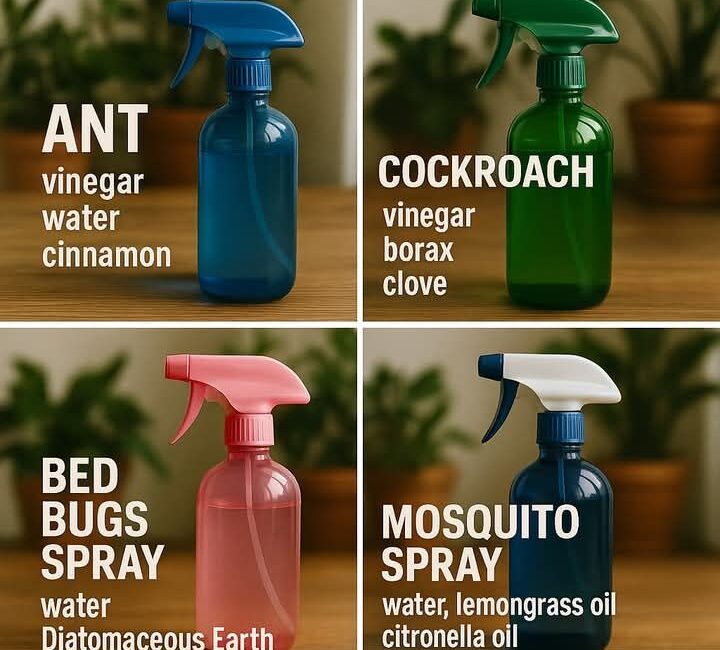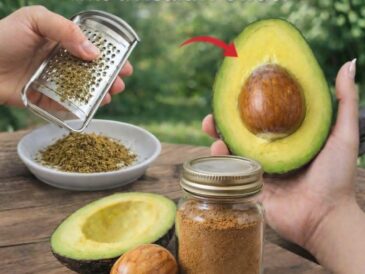4 Easy DIY Sprays Using Kitchen-Safe Ingredients
Dealing with household pests can be a real nightmare. From the tiniest ants marching in your kitchen to the persistent and unhygienic cockroach, the itchy, irritating bed bugs in your mattress, to the buzzing, disease-carrying mosquitoes — pests are a common problem in many homes worldwide. Conventional pesticides can be toxic to pets, kids, and even adults, and many products contain harmful chemicals that affect indoor air quality.
But what if you could manage these pests effectively using only natural, safe, and easily available kitchen ingredients? This article will show you exactly how to make four effective DIY insect sprays targeting ants, cockroaches, bed bugs, and mosquitoes — all using kitchen-safe, eco-friendly ingredients that are safe for you, your family, and the environment. These sprays are affordable, easy to make, and use non-toxic ingredients, which means you can use them frequently without worrying about harsh chemical exposure.
Why Choose Natural Pest Control?
Before diving into the recipes, it’s important to understand why natural pest control is a smart choice:
- Safety: Chemical pesticides often contain neurotoxins and carcinogens. Natural sprays use ingredients that are generally recognized as safe.
- Eco-Friendly: Avoid polluting water sources and harming beneficial insects like bees.
- Cost-Effective: Most ingredients like vinegar, essential oils, and diatomaceous earth are inexpensive and multi-purpose.
- Easy to Make: No special equipment or hard-to-find chemicals required.
- Effective: When used properly, natural sprays can disrupt pest behavior, act as repellents, or cause dehydration, leading to pest elimination.
Understanding the Targets: Pests and Their Weaknesses
Ants
Ants communicate and navigate using pheromone trails. Disrupting these chemical trails and repelling ants with strong scents can prevent infestations. Vinegar’s acidic nature breaks down pheromones, while cinnamon acts as a natural repellent.
Cockroaches
Cockroaches thrive in warm, moist environments like kitchen cracks, drains, and under appliances. They avoid bitter or toxic substances and are repelled by clove oil’s strong aroma. Borax acts as a stomach poison when ingested by cockroaches.
Bed Bugs
Bed bugs hide in mattress seams, furniture joints, and cracks. Diatomaceous earth (DE) is a natural abrasive that damages their exoskeleton, causing dehydration and death. Water-based sprays with DE help deliver the powder effectively.
Mosquitoes
Mosquitoes are repelled by strong citrus and herbaceous essential oils like lemongrass and citronella. Spraying these oils near entry points prevents mosquitoes from entering your home.
The Science Behind Each Ingredient
- Vinegar: Contains acetic acid, which disrupts insect pheromones and repels ants and cockroaches. Its acidic pH is hostile to many insects.
- Cinnamon powder: Contains cinnamaldehyde, a compound toxic to ants but safe for humans and pets.
- Borax (sodium borate): Toxic to cockroaches when ingested; it disrupts their digestive system.
- Clove oil: Contains eugenol, a natural insecticide with repellent properties.
- Diatomaceous earth (food grade): Fossilized remains of algae with microscopic sharp edges that puncture insect exoskeletons, causing dehydration.
- Lemongrass oil: Contains citronellal and geraniol, powerful mosquito repellents.
- Citronella oil: Widely used natural mosquito repellent derived from lemongrass species.
1. Ant Spray — Simple Yet Effective
Ingredients
- 1 cup water
- 1 cup vinegar (white or apple cider vinegar)
- 1 teaspoon cinnamon powder
Why it works:
Vinegar disrupts the ant pheromone trails, confusing ants and deterring them from following paths into your home. Cinnamon’s strong scent repels ants, and it’s safe to use around children and pets.
How to Prepare:
- In a spray bottle, mix equal parts water and vinegar.
- Add the cinnamon powder. Shake well to combine.
How to Use:
- Spray generously along kitchen corners, baseboards, window sills, and all ant entry points.
- Repeat daily until ants disappear.
- Wipe surfaces after a few minutes to remove ant trails and vinegar residue.
Additional Tips:
- Sprinkle extra cinnamon powder around doors and windows for extra protection.
- Keep your kitchen clean and dry, as ants are attracted to food crumbs and moisture.
2. Cockroach Spray — Kill and Repel the Unwanted Guests
Ingredients
- 1 cup vinegar
- 1 teaspoon borax
- 5 drops clove essential oil or 1 teaspoon clove powder
Why it works:
Borax acts as a slow-acting poison when cockroaches ingest it while grooming themselves. Clove oil’s pungent aroma repels cockroaches and masks their chemical trails. Vinegar helps dissolve grease and grime in cockroach-prone areas.
How to Prepare:
- Mix vinegar and borax thoroughly in a spray bottle.
- Add clove oil or powder, and shake well.
How to Use:
- Spray in kitchen cracks, sink drains, under refrigerators, behind stoves, and anywhere cockroaches hide.
- Avoid spraying on food preparation surfaces unless wiped clean afterward.
- Repeat every 2-3 days until you notice a reduction in cockroach activity.
Safety Notes:
- Borax should be handled carefully and kept away from pets and small children as ingestion can be harmful.
- Use gloves when applying if you have sensitive skin.
3. Bed Bug Spray — Safe and Targeted
Ingredients
- 1 cup water
- 1 tablespoon food-grade diatomaceous earth (DE)
Why it works:
DE physically damages the exoskeleton of bed bugs, causing them to dry out and die without using harsh chemicals.
How to Prepare:
- Add diatomaceous earth to water in a spray bottle.
- Shake vigorously before each use to keep DE suspended.
How to Use:
- Lightly mist mattresses, bed frames, baseboards, and furniture cracks where bed bugs hide.
- Avoid spraying so heavily that the powder pools or creates dust clouds (to prevent inhalation).
- Use a dust mask while applying to avoid breathing in powder.
Additional Advice:
- Combine spraying with vacuuming and laundering bedding in hot water for best results.
- Repeat weekly for 3-4 weeks to break bed bug life cycles.
4. Mosquito Spray — Keep the Buzzing Away
Ingredients
- 1 cup water
- 10 drops lemongrass essential oil
- 10 drops citronella essential oil
Why it works:
Lemongrass and citronella oils contain compounds that mosquitoes find highly repellent. Spraying these oils near entry points creates an invisible barrier mosquitoes avoid.
How to Prepare:
- Mix water with lemongrass and citronella oils in a spray bottle.
- Shake well before each use.
How to Use:
- Spray around windows, doors, porch areas, and near light sources where mosquitoes gather.
- Reapply every few hours or after rain if used outdoors.
- Avoid direct spraying on skin to prevent irritation.
Safety Considerations for DIY Sprays
- Always label your spray bottles clearly.
- Store sprays away from children and pets.
- Test sprays on small surface areas to check for discoloration or damage.
- Avoid mixing essential oils with heat or flame, as they are flammable.
- Use food-grade diatomaceous earth to ensure safety in living areas.
- Consult your doctor if using essential oils around babies or individuals with allergies.
Additional Natural Pest Prevention Tips
- Keep your home clean: Pests thrive in crumbs, spills, and clutter.
- Seal entry points: Use caulk or weather stripping to close cracks and gaps.
- Eliminate standing water: Mosquitoes breed in stagnant water—remove buckets, trays, and clogged gutters.
- Use physical barriers: Mosquito nets, window screens, and tight-fitting lids on trash cans reduce pest access.
- Rotate treatments: Pests can develop tolerance; switching sprays or combining methods helps.
Frequently Asked Questions (FAQ)
Q1: How long do these sprays last?
Most sprays should be reapplied every few days, especially in humid or rainy conditions, as natural ingredients evaporate or degrade faster than chemical pesticides.
Q2: Can I use these sprays on pets?
Avoid spraying directly on pets. While ingredients are generally safe, sensitive animal skin or ingestion risks mean you should consult a vet before use.
Q3: Are essential oils safe for children?
Use essential oils cautiously around children, especially under age 2. Dilute well and avoid direct skin application.
Q4: Can these sprays be used outdoors?
Yes, especially the mosquito spray works well around outdoor patios and doorways but may require frequent reapplication.
Q5: What if my pest problem is severe?
For heavy infestations, combine natural sprays with professional pest control or traps. Natural remedies work best as preventative or maintenance solutions.
Conclusion: Effective and Eco-Friendly Pest Control at Your Fingertips
With these four simple, kitchen-safe DIY sprays, you can take control of common household pests naturally and safely. Whether it’s ants invading your pantry, cockroaches hiding under your sink, bed bugs causing itchy nights, or mosquitoes ruining your summer evenings — these recipes offer effective alternatives to harsh chemicals.
Not only do they protect your family and pets from toxic exposures, but they also contribute to a healthier indoor environment. Plus, using common ingredients means you can prepare these sprays quickly and affordably.
Try these sprays consistently, follow the tips, and embrace a natural, eco-conscious approach to pest management. Say goodbye to unwanted creepy crawlies and hello to a pest-free home!




